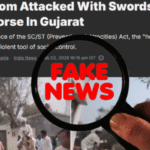Bihar is due for assemble elections in the next few months and the political climate is only growing intense. Tejashwi Yadav, the leader of the Rashtriya Janata Dal (RJD) and former Deputy Chief Minister, has leveled grave accusations against the ruling National Democratic Alliance and the Election Commission concerning the Special Intensive Revision (SIR) of the voter list.
He has claimed that should the purported manipulation and rigging of the voter list persist, the opposition might contemplate a boycott of the upcoming polls.
#WATCH | Patna | On Bihar SIR, RJD leader Tejashwi Yadav says,"…We (all parties in Mahagathbandhan) could talk about boycotting the elections. We have this option." pic.twitter.com/uyn2a9DVy1
— ANI (@ANI) July 24, 2025
Previously, similar statements were made by individuals such as Purnia independent MP Pappu Yadav and alleged journalist Ravish Kumar, who are believed to be associated with the “Bangladeshi toolkit.” They are attempting to replicate the same actions which have led to the ongoing unrest and violence in the neighbouring country.
Tejashwi Yadav’s statement: Strategy, warning or fear of loss
“If the elections are being manipulated, then why would people cast their votes? In such circumstances, the government should consider granting an extension,” Tejashwi Yadav stated while talking to the media in Patna. He further mentioned that if the Mahagathbandhan and the public reach a consensus on this issue, they would deliberate on the possibility of boycotting the elections.
On the surface, this appears to be a strategic plot intended to exert pressure on the NDA government and the Election Commission. However, his remarks indicate a clear lack of seriousness, as historically, no significant political party in India has ever boycotted an entire election, even when concerns were raised regarding matters such as EVMs or voter lists.
Tejashwi’s statement is understandably regarded with seriousness, given his significant stature in Bihar politics. However, the pertinent question arises: Is this statement merely a strategy to galvanize public support or does it genuinely indicate his apprehension of losing?
In the 2024 Lok Sabha elections, the I.N.D.I. Alliance secured 9 seats whereas the NDA achieved 31 seats. According to the C-Voter survey, Tejashwi’s popularity has declined from 41% to 35% while Nitish Kumar enjoys an acceptability rate of 58%. The latter’s reputation for development and initiatives such as the 35% reservation for women have further bolstered his position.
On the other hand, during the process of removing 53 lakh voters from the electoral roll, it was estimated that 90% of them endorse the opposition bloc. Tejashwi’s remark underscores the potential risk of him losing support.
Important statistics related to SIR
The political battle over the Special Intensive Revision (SIR) of the voter list in Bihar is at its highest point. According to the Election Commission, the aim of SIR is to refresh the voter list and eliminate fraudulent or non-citizen voters. The Election Commission reported that out of 7.89 crore voters in Bihar, 97.30% filled the forms.
However, 52.3 lakh voters could not be located at their registered addresses (6.62% of the total). Among these, 18.66 lakh are deceased, 26.01 lakh have relocated, 7.09 lakh are duplicates and 1 lakh are untraceable.
The campaign is being executed by 1,00,000 Booth Level Officers (BLOs) and 1,50,000 political agents (including opposition members). The opposition contends that 53 lakh votes are being invalidated of which 90% belong to their supporters. Nevertheless, data suggests that it is crucial to remove deceased, duplicate and shifted voters to stop fake voting.
For instance, is it truly democratic to retain 20 lakh deceased voters on the electoral list? The presence of 7 lakh duplicate entries could facilitate voting in two different locations. Additionally, the addresses of 1 lakh voters are untraceable, potentially indicating they are either foreign nationals or fraudulent entries. The SIR is also in the process of filtering out voters from Nepal, Bangladesh and Myanmar.
The Election Commission has asserted that 96-98% of the necessary corrections have been accomplished. Furthermore, it has indicated that individuals whose names have been incorrectly removed or who have yet to be included, will have the opportunity to rectify this from 1st August to 1st September.
However, Tejashwi labeled it as “fake.” He declared, “In the past, voters elected the government and now the government selects the voters.” The exclusion of fraudulent voters from SIR will have repercussions on his primary voter base. Therefore, there is a strategy to mobilize the public by issuing threats of a boycott. Nonetheless, if victory was in sight, why would they exit the arena? This demonstrates their fear of losing.
Bangladeshi toolkit and history of anarchy
All that is occurring does not appear to be a simple coincidence. The language and tactics employed by the opposition seem to draw inspiration from Bangladesh, where the opposition party BNP chose to boycott the 2023-24 elections. Afterward, Khaleda Zia’s party incited violence and chaos by casting doubt on the elections’ credibility, thereby challenging the Sheikh Hasina administration. This same plot is being utilized in India as well.
The involvement of international actors has been evident in the farmers’ protest, Shaheen Bagh, and now the SIR controversy. For instance, the European Union ambassador in Bangladesh raised questions about the elections, and similarly, in India, foreign media and NGOs exacerbate issues such as EVM tampering.
This toolkit is prominently displayed in Bihar. Pappu Yadav, who became an independent Member of Parliament after failing to secure a ticket from Congress in 2024, is also promoting a boycott of the elections. Nevertheless, he stated that rather than boycotting, it would be more effective for the opposition to resign from both the Assembly and Lok Sabha.
Ravish Kumar also expressed on his YouTube channel, “Why are you holding elections? Just enter the print command and publish the results.”
अभी वोटर लिस्ट का ड्राफ्ट बना भी नहीं है,लोगों ने दस्तावेज़ भी नहीं दिए हैं, अपील का मौक़ा तक नहीं मिला है लेकिन जागरण लिख रहा है कि 35 लाख वोटर के नाम काटने की तैयारी। इतनी तैयारी हो चुकी है तो चुनाव क्यों करा रहे हैं, प्रिंट कमांड दीजिए और रिज़ल्ट छाप दीजिए। क्या जागरण की इस… pic.twitter.com/SR6KVOCcZw
— ravish kumar (@ravish_journo) July 15, 2025
The rhetoric of Pappu Yadav and Ravish is fostering chaos. When power is not acquired through democratic means, there is a tendency to resort to boycotts and violence. A similar strategy was attempted during the Maharashtra elections, where Rahul Gandhi claimed match-fixing and collusion, yet it did not yield any success for him.
Currently, an agenda is being propagated in Bihar under the pretext of SIR. This toolkit is influenced by external forces that seek to create instability in India. Sheikh Hasina was compelled to leave Bangladesh and now there is a conspiracy aimed at undermining PM Modi. However, in Bihar, this effort is faltering, as Nitish Kumar’s reputation remains strong and the NDA stands united. The opposition’s plan is on the brink of failure as the public has become aware of such manipulative tactics.
Are Pappu Yadav and Ravish Kumar merely instruments of the toolkit
Pappu Yadav’s remarks align with those of Tejashwi, but his plank his weak. The Congress party did not award him a ticket for the 2024 Lok Sabha elections and he was excluded from the stage during the Mahagathbandhan’s recent protest. Nevertheless, he continues to question SIR and the electoral process.
Ravish Kumar’s remarks and his approach to journalism also appear to support the narrative of the opposition. Some individuals contend that this represents a meticulously crafted strategy, wherein opposition leaders and certain journalists are trying to brew discontent among the populace.
Simultaneously, Tejashwi’s approach involves exerting pressure on the NDA and the Election Commission, although the likelihood of success remains uncertain. Should the Mahagathbandhan consolidate, the NDA might find itself in a precarious position as the rural and impoverished view voting as a imperative exercise. However, the silence from Congress indicates a lack of unity. The opposition plans to stage a symbolic protest through a boycott, yet the public is likely to side with the NDA.
Attack on democracy or strategic move
Tejashwi’s declaration to boycott the elections may be interpreted as an assault on democracy, as it undermines the essential democratic right of voting. In Bihar, the rural and impoverished population regards voting as a core democratic right. Should the opposition choose to boycott, it could foster dissatisfaction among the people while simultaneously damaging the credibility of the Mahagathbandhan. Congress and other coalition partners have not yet expressed unequivocal support for this statement which could potentially weaken Tejashwi’s position.
Rahul Gandhi has asserted that he possesses “100% proof” of electoral fraud in Karnataka, however, he has not disclosed it publicly. This claim supports Tejashwi’s remarks, yet if the opposition fails to consolidate, it will remain merely symbolic. Union Minister Rajiv Ranjan Singh criticized him, stating, “He believes he cannot secure victory in the elections without fraudulent voters.”
Political equations and future of Bihar
The NDA holds a strong position in Bihar. The clean reputation of Nitish Kumar, along with the backing of leaders such as Jitan Ram Manjhi and Chirag Paswan, combined with the BJP’s strategy have placed the Mahagathbandhan in a defensive stance. Tejashwi’s support base, which includes Yadavs, Muslims and OBCs, appears to remain loya. However, there is a potential risk of a decline in his voter support following SIR. If Tejashwi and the opposition decide to pursue a boycott, it may further guarantee their loss.
Tejashwi’s threat is more strategic than serious. This tactic is part of the Bangladeshi toolkit, which promotes anarchy through boycotts. However, in Bihar, Nitish’s reputation and the transparency of SIR are dismantling the opposition’s plans.
The assault on democracy must come to an end and the opposition should argue with factual evidence. SIR intends to implement a transparent election process which represents genuine democracy. If a boycott is initiated, the opposition will find itself in isolation. The people of Bihar are discerning and will not fall prey to such strategies.
The electorate of Bihar, who view voting as their basic right might not endorse this tactic. If Tejashwi and the opposition wish to preserve their lost ground, they need to connect with the public and share their viewpoints instead of opting for a boycott.
Read the report in Hindi here.














